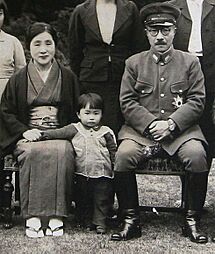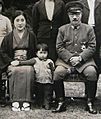Yuko Tojo facts for kids
Quick facts for kids
Yuko Tojo
|
|
|---|---|
| 東條 由布子 | |

Yuko Tojo (center) as a young girl with her grandmother Katsuko and grandfather, Hideki
|
|
| Born |
Yoshie Tojo
20 May 1939 |
| Died | 13 February 2013 (aged 73) |
| Nationality | Japanese |
| Other names |
|
| Alma mater | Kokushikan University |
| Occupation | Politician, Insurance agent |
| Employer | Dai-Ichi Insurance Company |
| Known for | granddaughter of Hideki Tojo |
| Children | 4 |
| Relatives |
|
Yuko Tojo (東條 由布子, Tōjō Yūko, May 20, 1939 – February 13, 2013) was a Japanese politician who held strong nationalistic views. She was also known for defending Japan's actions during World War II.
Yuko Tojo was the granddaughter of Hideki Tojo, who was Japan's prime minister during World War II. Her grandfather was found responsible for actions during the war and was executed in 1948.
Contents
Yuko Tojo's Political Views
In May 2007, when she was 68 years old, Yuko Tojo decided to run for a seat in Japan's House of Councillors. She ran on a platform that supported very strong nationalistic ideas.
Tojo publicly disagreed with the idea that Japan committed war crimes during the Second Sino-Japanese War and World War II. She believed that some historical accounts were not accurate.
Views on the Nanjing Event
Yuko Tojo supported a movie called The Truth about Nanjing. The filmmaker, Satoru Mizushima, made this movie to challenge common beliefs about the 1937 Nanjing Massacre.
Mizushima claimed that the Nanjing Massacre was a story created for political reasons by China and some Western observers. Tojo shared these views and supported the film's message.
Many Japanese nationalists, including former Prime Minister Shinzō Abe, kept their distance from Yuko Tojo's more extreme views.
Later Life and Passing
Yuko Tojo passed away on February 13, 2013. She was 73 years old. Her death was caused by a lung condition called interstitial pneumonia.
She had entered politics about ten years before her death. Tojo once said, "People think I'm a hawk, but I'm actually a dove on the torii of Yasukuni Shrine". This meant she saw herself as peaceful, even though her political views were often seen as aggressive.
Images for kids
 | Laphonza Butler |
 | Daisy Bates |
 | Elizabeth Piper Ensley |


